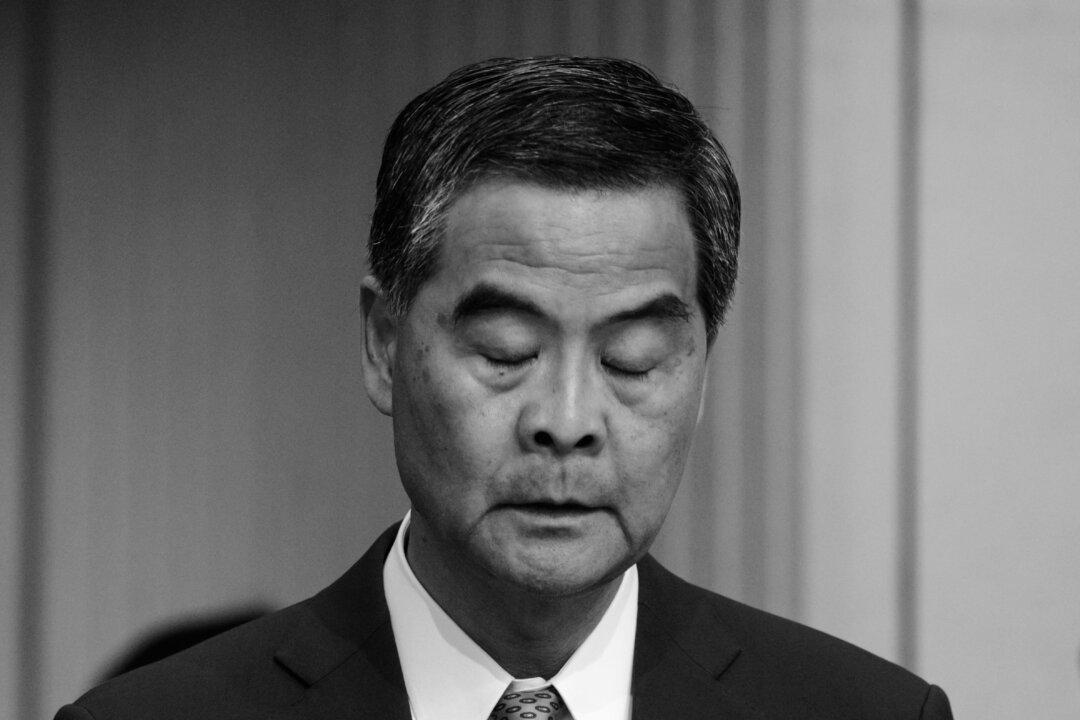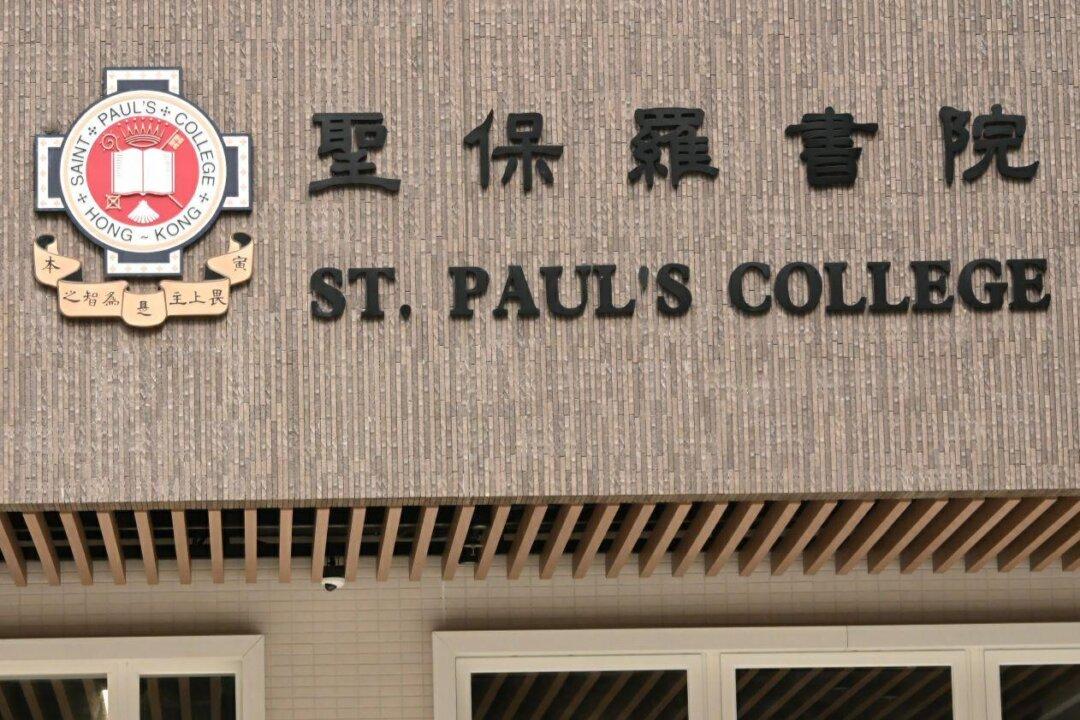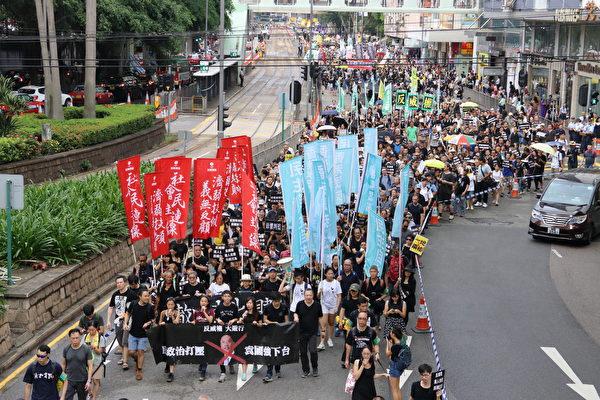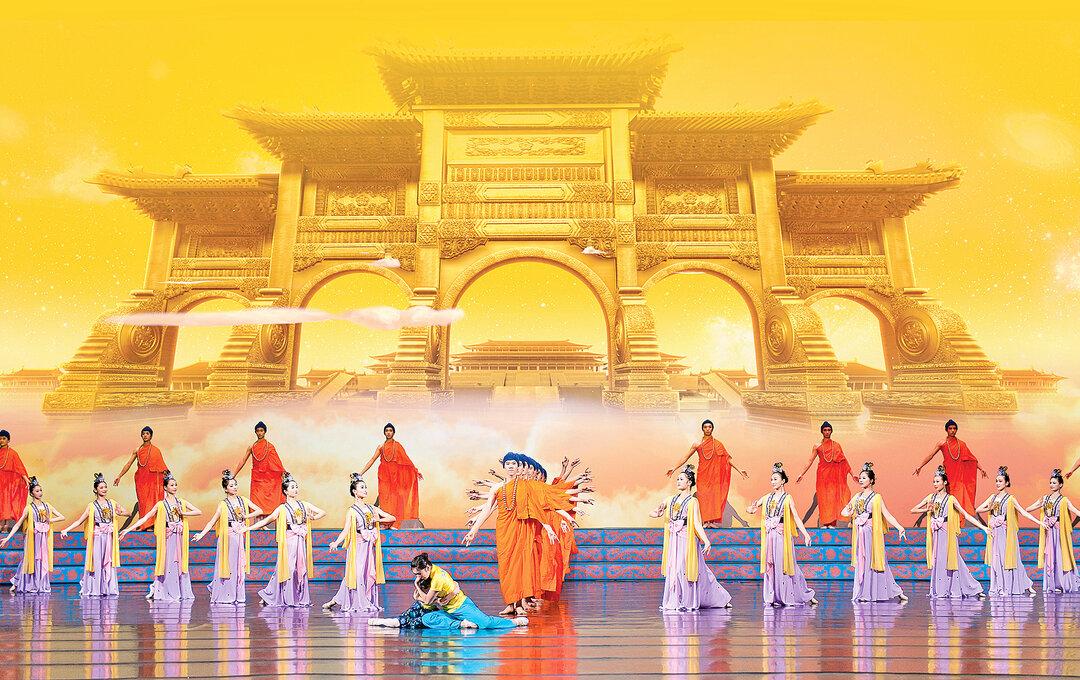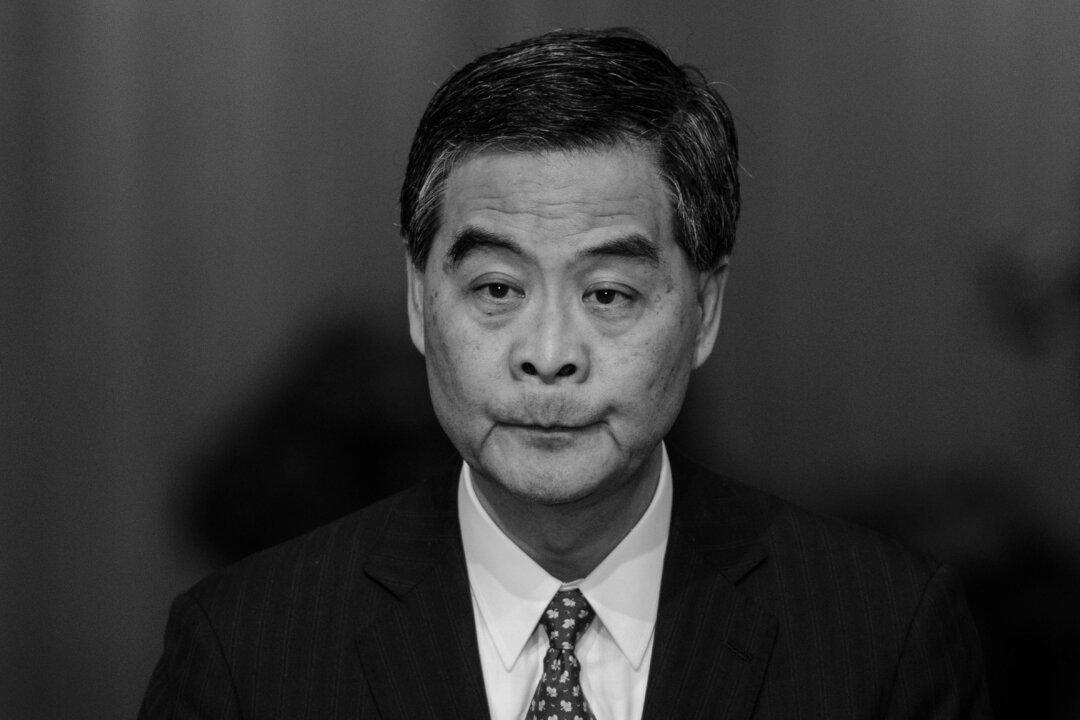HONG KONG—Leung Chun-ying, the chief executive of Hong Kong, is not in good standing with the present Chinese leadership and will almost certainly not be endorsed for a second term come election time next March, Epoch Times has learned.
The source, an individual with authoritative information about the delicate political operations between China and Hong Kong, said that members of the Xi Jinping administration in Beijing are unified in opposition to Leung seeking another five-year term next year, and that he has “virtually no chance of getting reelected.” The source added: “He won’t be allowed to stay on, and can’t possibly stay on.”
Candidates for the office of Hong Kong Chief Executive typically try to seek some form of endorsement from Beijing; the latest round of elections are slated for the end of March 2017.
One of the reasons for Beijing’s estrangement from Leung is closely related with Communist Party general secretary Xi Jinping taking the title of “core” leader after a key political conclave in the last week of October, the source said. Since taking top office in 2012, Xi has been purging the Party of Jiang’s elements, and consolidating power. Xi’s formal assumption of status as paramount leader sends a message that the political strength of the previous “core” leader, former Party boss Jiang Zemin, is on the wane.
Leung is widely considered to be part of Jiang’s faction through his association with Zeng Qinghong, Jiang’s right-hand-man and former Chinese vice chairman.
Leung Chun-ying, a highly unpopular figure among the Hong Kong public, has overseen a series of tumultuous incidents that have frustrated the Xi Jinping leadership, the source indicated.
Shortly after he came to power in 2012, his administration sought to introduce a form of “national” education along guidelines issued by Beijing. Many Hongkongers saw this as an attempt at communist brainwashing, and tens of thousands took the streets in protest.
In 2014, the Hong Kong police fired 87 canisters of tear gas into a large crowd protesting outside government headquarters, sparking a 79-day long street occupation by tens of thousands of young people.
In recent years, Leung has sought to play up the issue of pro-independence elements in the city, even though a majority of Hongkongers aren’t supportive of a sovereign Hong Kong.
According to the source, the tipping point for the Xi Jinping leadership on Leung Chun-ying came when Leung’s Hong Kong government blocked New York-based Chinese language broadcaster New Tang Dynasty Television (NTD) from holding its classical Chinese dance competition in the city.
“Leung did his utmost to block an apolitical cultural performance,” the source said. “This caused a stir in Zhongnanhai,” the headquarters and residence of the Chinese regime’s top leaders, as well as the pro-Beijing camp in Hong Kong.
This July, two Hong Kong theaters that had signed a contract with NTD—a sister media of Epoch Times—for the use of their venue abruptly reneged on their agreements after becoming the subjects of intense political pressure. Communist Party front groups connected with Jiang Zemin’s underground network in Hong Kong also constantly harassed and hampered NTD’s efforts at promoting the dance competition.
Having lost its venues, NTD was forced to relocate the dance competition to nearby Taiwan at the last minute. The Hong Kong government was censured by local lawmakers, U.S. Congresspeople, and members of the European Parliament.
“The present Chinese leadership absolutely won’t let Leung Chun-ying stir up trouble in Hong Kong again,” the source said. “He not only won’t get reelected, but he'll also be dealt with.”
The serving Hong Kong leader’s recent, surprise cancellation of a trip to Beijing appears to corroborate the source’s analysis.
Leung was originally scheduled to attend the opening ceremony of a Beijing-Hong Kong economic symposium with former Beijing mayor Wang Anshun on Nov. 3, but announced on Oct. 31 that he wouldn’t be going. A day before the announcement, Wang had resigned his mayorship, reportedly for a position at a state think-tank — a far less prestigious and powerful post. According to overseas Chinese newspaper World Journal, Wang is also a protégé of Zeng Qinghong, and is thus linked with Jiang Zemin’s political network.
“Communist Party insiders are aware of the present Party leadership’s attitude towards Leung,” the source said, and Leung knows that he won’t be well-received in Beijing. Leung is also afraid that the media will catch wind of and publicize his failure to secure an endorsement from Beijing to seek reelection in Hong Kong, the source indicated.
The information also raises questions about recent rumors that the Chinese regime’s rubber stamp legislature, the National People’s Congress, which is controlled by a political rival to the Chinese leader Xi Jinping, will seek to intervene in an important, looming judicial process in Hong Kong.
Several Hong Kong news outlets have reported that the Chinese regime’s faux legislature will seek to interpret the Basic Law, Hong Kong’s mini-constitution, when it meets on Nov. 3, with regards to a case involving two new members of the Hong Kong Legislative Council who had turned the ceremony of taking an oath of office into a protest against China. If the NPC makes this interpretation, it will preempt the Hong Kong high court from reviewing this case.
If the Chinese legislature does issue an interpretation, it would be the fifth such action since the British handover in 1997. These interpretations are always controversial because they serve to remind Hongkongers that they are ultimately governed by communist China.
Leung had earlier suggested that he would ask Beijing to get involved in the case, which has angered members of the Hong Kong legal establishment, which see Leung’s request as undermining the judiciary in Hong Kong.
However, Sing Pao Daily, a pro-Beijing newspaper that is believed to speak for the Xi camp, claims in a Nov. 2 report that speculation of an NPC interpretation “aren’t true.” The following day, Sing Pao wrote that NPC interpretations are a “serious matter” and not concocted “in a black box.” Sing Pao concluded the article by reminding Politburo Standing Committee member Zhang Dejiang of Xi’s recent condemnation of conspiring “cliques and cabals” among “a very small group” of elite cadres, and called on Zhang to “take heed.”
If Leung is truly being sidelined by the Chinese leadership, it would be unlikely for the Standing Committee of the National People’s Congress to issue a controversial interpretation after its Nov. 3 meeting.
In the event that an interpretation is in fact issued, it would suggest that the remaining elements of Jiang Zemin’s network still holding high office—in this case, Zhang Dejiang, who serves as the chief of the NPC and the overseer of Hong Kong—are attempting a retaliatory blow against Xi Jinping for his scorching anti-corruption campaign that has jailed so many Jiang acolytes.
Zhang has caused trouble before: In 2014, a white paper on Hong Kong issued by the Zhang-led legislature roused strong sentiments in Hong Kong, giving birth to the Umbrella Movement.
He Jiahui contributed to this article.
